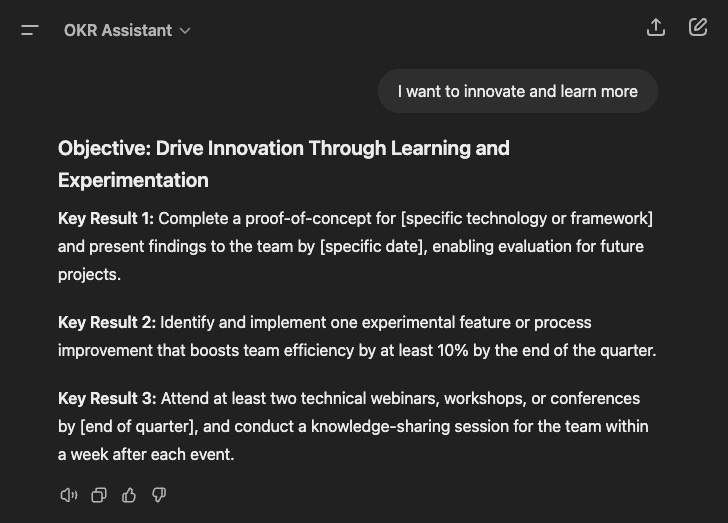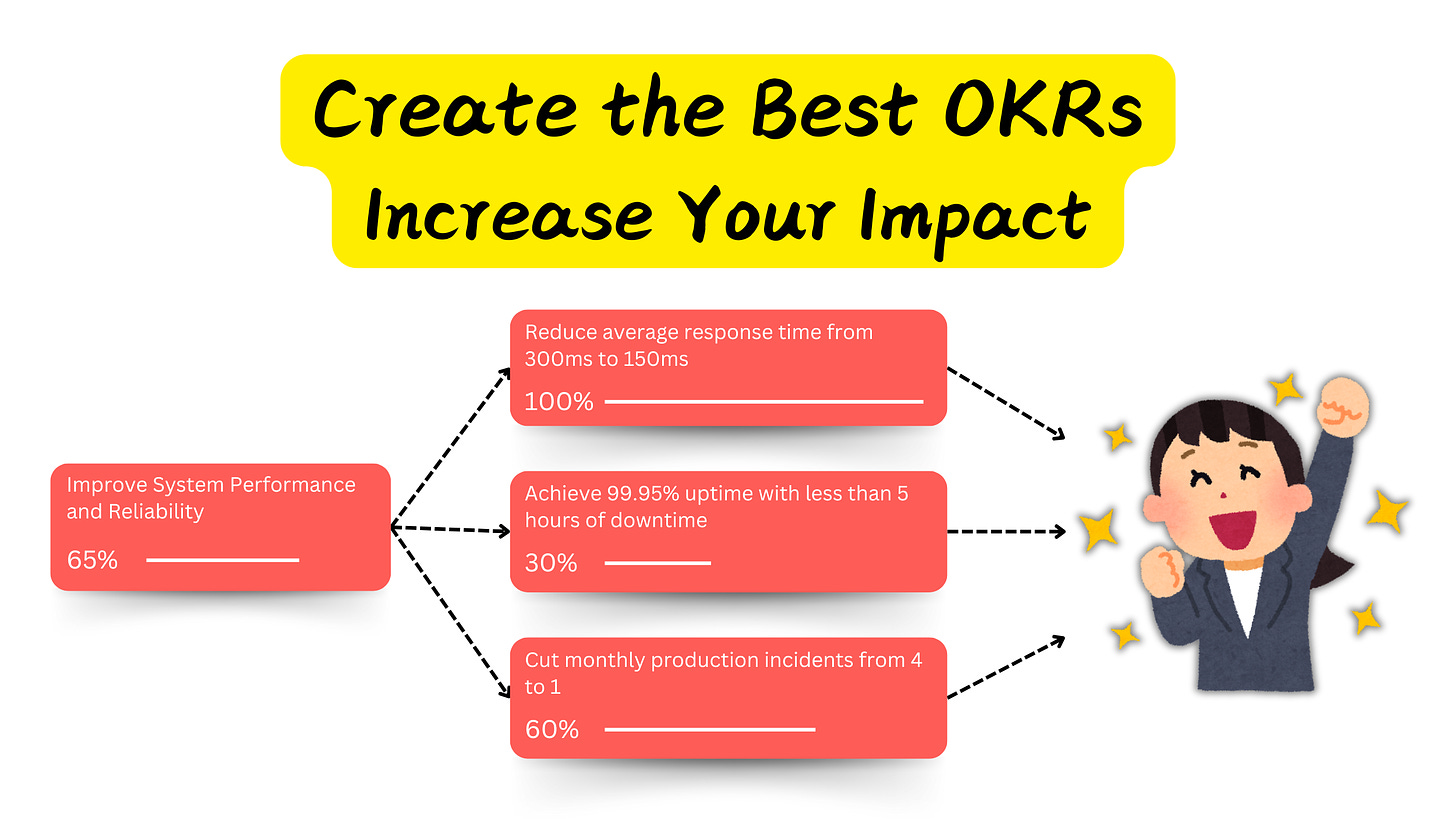How to Create the Best OKRs to Increase Your Impact
Transform Your Goals into High-Impact OKRs: Examples for Every Level + Your Personal OKR GPT Assistant 🤖
Why Creating Great OKRs Is Hard (But Worth It)
Creating OKRs (Objectives and Key Results) sounds simple: define a goal, pick a few measurable outcomes, and you’re done. Right?
Wrong.
In practice, writing great OKRs is deceptively difficult. Many engineers and teams struggle with:
Vague Objectives: Goals like “improve performance” or “become a better communicator” are hard to measure, making it difficult to know what success actually looks like.
Task-Oriented Key Results: Tracking activities like “implement caching” or “set up monitoring” measures effort, not impact.
Unclear Metrics: OKRs without clear success metrics leave too much room for interpretation, requiring endless debates over whether a goal was really achieved.
Great OKRs, however, eliminate this uncertainty. They don’t just define what you want to achieve, they also make it unquestionable whether you succeeded. Well-written OKRs are:
Crystal Clear: Anyone reading them knows exactly what success looks like and how it will be measured.
Outcome-Focused: They track results, not just effort, to ensure that the work you do leads to a tangible, valuable impact.
Measurable Without Ambiguity: There should be no debate at the end of the quarter about whether a key result was achieved. Metrics and targets make the answer self-evident.
In this post, I share how to write OKRs that meet these criteria. By the end, you’ll know how to craft OKRs that are actionable, measurable, and aligned with your personal growth and team’s success.
Consider supporting my work and subscribing to this newsletter.
As a free subscriber, you get:
✉️ 1 post per week
🧑🎓 Access to the Engineering Manager Masterclass
As a paid subscriber, you get:
🔒 1 chapter each week from the book I am writing “The Engineering Manager’s Playbook”
🔒 50 Engineering Manager templates and playbooks (worth $79)
🔒 The complete archive
Start with a Purpose: Identify the Focus Area
Before even thinking about the OKR, ask yourself: What’s one impactful area I want to work on?
Your OKRs should address a key personal development area or team need. Some common focus areas include:
Technical skills: Learning a new framework, or improving codebase quality.
System performance: Reducing latency, improving uptime.
Collaboration: Improving cross-team processes or communication.
Leadership development: Mentoring, leading projects.
Let’s say your focus is system performance. You’ve noticed that slow API response times are frustrating users.
Let’s see how we can shape this issue/opportunity into an OKR.
Craft a Strong Objective: Set the North Star
An objective is your destination. It’s what you want to achieve and why it matters. A strong objective is:
Aspirational but achievable.
Outcome-focused, not task-driven.
Aligned with team or company goals.
For our system performance example:
Weak Objective: Improve system performance.
Strong Objective: Enhance the scalability and reliability of backend services to support growing user demand.
Notice how the strong objective adds context. It’s clear why this matters: to handle user growth.
Write SMART Key Results: Define Success
Objectives set the direction, but Key Results measure your progress. Think of them as milestones that define what success looks like.
Great Key Results are SMART:
Specific: Clearly state what you’re achieving.
Measurable: Quantify success.
Achievable: Challenging but realistic.
Relevant: Directly tied to the objective.
Time-Bound: Includes a deadline.
For our objective, here’s how Key Results can look like:
Increase the system's load capacity to handle 50% more concurrent users (from 10,000 to 15,000) without performance degradation by the end of the quarter.
Achieve 99.95% uptime for backend services, reducing unplanned downtime from 10 hours to 4 hours per quarter.
Each Key Result contributes directly to the objective. Together, they define how “enhanced scalability and reliability” can be measured.
Tip: Focus on outcomes, not tasks. Avoid KRs that track activities like “implement caching” or “set up monitoring.” Instead, measure the impact of those tasks on your system’s performance.
Shift from Tasks to Outcomes
A common mistake is confusing tasks with outcomes. Tasks describe what you’ll do; outcomes describe what you’ll achieve.
Task-Oriented KRs (❌)
Implement caching
Write tests for module
Outcome-Oriented KRs (✅)
Reduce query response time by 30%
Increase code coverage from 60% to 90%
By focusing on outcomes, you ensure your work drives tangible results. Ask yourself, What’s the result I’m aiming for? Then write a Key Result that captures that impact.
Test Your OKRs: Are They Clear and Challenging?
Once you’ve drafted your OKRs, test them using these two checks:
Clarity Test: Could a team member easily understand your OKRs? Do they know exactly what success looks like?
Challenge Test: Do these OKRs push you to stretch your skills and deliver impact?
If your OKRs fail either test, refine them.
Align and Iterate with Your Manager
Even the best OKRs can benefit from feedback. Work on creating them with your manager. This will help you on:
Alignment: Your OKRs contribute to broader team or company goals.
Refinement: Your manager might suggest adjustments for greater impact.
Experiment using the OKR Assistant
👉 I have created an OKR Assistant GPT to help in that process which you can find here.
Here’s how it works:
Enter your focus area (e.g., system performance, leadership).
Get a tailored Objective and Key Results.
Review and refine as needed.
Example:
Focus Area: I want to innovate and learn more
Objective: Drive Innovation Through Learning and Experimentation.
Key Results:
Complete a proof-of-concept for [specific technology or framework] and present findings to the team by [specific date], enabling evaluation for future projects.
Identify and implement one experimental feature or process improvement that boosts team efficiency by at least 10% by the end of the quarter.
Attend at least two technical webinars, workshops, or conferences by [end of quarter], and conduct a knowledge-sharing session for the team within a week after each event.
OKR Examples for all Levels
Junior Engineer
Objective: Build foundational skills and contribute effectively to team projects.
Key Results:
Complete 2 assigned user stories independently each sprint with minimal revisions.
Achieve 80% coverage on unit tests for all personal code contributions by the end of the quarter.
Participate in at least 3 code reviews per sprint and provide actionable feedback in line with best practices.
Objective: Accelerate learning and improve collaboration within the team.
Key Results:
Pair program with a senior engineer at least once per sprint.
Deliver one internal presentation or demo on a topic learned (e.g., a new tool, framework, or project feature) by the end of the quarter.
Resolve at least 5 minor bugs or technical debt items from the backlog by the end of the quarter.
Mid-Level Engineer
Objective: Enhance the performance and reliability of key systems.
Key Results:
Reduce the average response time of [specific service or API] from 300ms to 200ms by the end of the quarter.
Achieve 99.9% uptime for [specific service] from 99.5% by the end of Q4.
Reduce the number of recurring production incidents from 5 per month to fewer than 2 per month.
Objective: Increase impact through technical leadership and cross-team collaboration.
Key Results:
Lead the technical design and implementation of at least one major feature or system improvement by the end of the quarter.
Mentor at least one junior engineer, holding weekly check-ins and tracking progress through feedback on code reviews and assignments.
Facilitate one cross-team architecture discussion or tech talk per month to align on best practices and promote knowledge sharing.
Senior Engineer
Objective: Lead efforts to improve the scalability and efficiency of critical systems.
Key Results:
Increase the system's throughput capacity by 20% by optimizing database queries and improving caching mechanisms by the end of the quarter.
Reduce cloud infrastructure costs by 15% by identifying and addressing inefficiencies in resource utilization by Q4.
Implement a robust CI/CD pipeline for [specific project] to reduce deployment time from 1 hour to under 15 minutes by the end of the quarter.
Objective: Enhance team productivity and mentorship to drive long-term success.
Key Results:
Mentor 2 mid-level engineers, helping them achieve 2 personalized growth goals each by providing regular feedback and conducting bi-weekly 1:1s.
Lead 3 cross-functional initiatives to improve collaboration with product and design teams, ensuring alignment on technical feasibility and delivery timelines.
Conduct 2 in-depth post-mortems for critical incidents and implement process improvements to prevent similar issues, reducing resolution time by 30%.
Staff+ Engineer
Objective: Drive architectural improvements to enhance scalability, maintainability, and reliability of critical systems.
Key Results:
Design and deliver a new service-oriented architecture (SOA) for [specific system], improving scalability and reducing inter-service dependencies by 30% by the end of the quarter.
Reduce the system’s mean time to recovery (MTTR) from 2 hours to 30 minutes by implementing advanced monitoring, alerting, and automated remediation tools by Q4.
Publish a comprehensive technical roadmap for [specific domain or system] and align 100% of engineering teams by holding 3 cross-functional alignment sessions.
Objective: Drive organizational excellence through mentorship, thought leadership, and cross-team collaboration.
Key Results:
Mentor 3 senior engineers, helping them take on more technical leadership responsibilities by defining growth plans and tracking their progress quarterly.
Lead and deliver 2 company-wide technical initiatives (e.g., implementing a unified logging framework) by the end of the quarter, improving engineering efficiency across teams by 20%.
Author and present at least 1 external tech talk or blog post showcasing the organisation’s technical innovation, enhancing the company’s brand in the tech community.
TL;DR:
To craft OKRs that truly deliver:
Identify a focus area: What’s the most impactful thing you want to improve?
Write a strong objective: Make it aspirational, outcome-driven, and aligned.
Define SMART Key Results: Make success measurable and time-bound.
Focus on outcomes, not tasks: Measure impact, not effort.
Refine and align with your manager: Ensure your OKRs support team goals.
Useful links
👨💻 Become a better Software Engineer with CodeCrafters (use my partner link to get 40% off and build your own Redis, Git, Kafka and more from scratch).
🎯 Book a mock interview with me (System design or Behavioural & Leadership) to smash your next real interview!
👋 Let’s connect on LinkedIn!






Great post!
One challenge I run into when focusing on outcomes is there's no metrics or data available about the current systems. So then the problem becomes - should we improve this on qualitative data (and gut feeling) OR get the DORA metrics first.